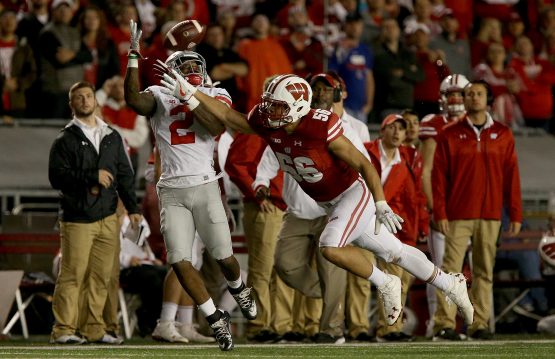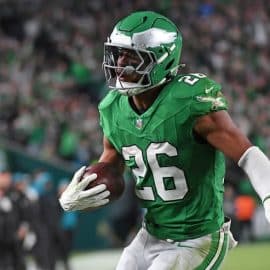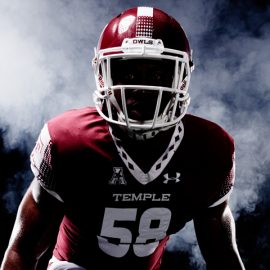As we gear up for Eagles training camp, I am reminded by the Brizerian Theorem that there are two sides to every metric…
Yes, you want to be in top physical condition going into training camp… But no, you do not want to look and feel like a skeleton coming out of it…
There are the occasional guys who come into camp now and are too fat. But those guys are the exception these days. Most guys know that this sport is a year-round business. And they take care of their diets and workout regimens accordingly.
But a new development is the guy who comes into camp at perfect weight— and then proceeds to lose too much weight and muscle mass during the preseason.
It happens. The days ahead will be super hot and humid. Talking to Bri's old Wilkes-Barre friend Qadry Ismail yesterday on WBAL-AM, "The Missile" revealed his biggest problem in TC was "losing weight"— too much and too fast.
"I remember guys on the Vikings when I played who were dropping 14 pounds a day during camp," said Qadry. "Of course, these days we have better hydration regimens. If you're not drinking at least a gallon of water a day during camp, you are going to be a bag of bones by the end of it…"
This also speaks to Eagles' HC Chip Kelly's emphasis on drinking power shakes during practice.
Yes, amazingly, you can lose too much weight too fast if you are lucky enough to be invited to a pro football training camp.
It's a physiological hazard of training camp.
Tradition always seems to have a place in the NFL. Thirty years ago, players were not making anywhere near the money they are today. Most even had offseason jobs. Offseason conditioning programs were just starting out and there was no such thing as OTA’s.
When players arrived at camp, it was to get into shape, learn the playbook and prepare for the upcoming season. In today’s NFL, that has changed.
Today’s game is just about year-round for the players, coaches and staff. Players usually have a couple of months off after the season to give their bodies a rest. Then the offseason programs begin. Players put in a good five hours a day during these conditioning programs. There are weight-lifting periods, classroom work and on-the-field work. This usually happens four days a week.
Sometime after the draft, OTA’s (organized team activities) begin. This gives a team 14 practices to go along with a mini-camp weekend comprised of another three or four practices. So heading into training camp, the team has already had 17 or 18 full practices plus numerous other days of work. Training camp is now spent more on fine-tuning than getting guys into shape and ready to play.
The typical training camp day may differ from team to team but they are pretty similar. In the morning there may be two to three hours of team and positional meetings followed by an hour of weight lifting. After lunch, players may get an hour of rest before heading off to the training room to get ready for practice. Practices usually run about two hours.
After practice, players get treatment for bumps and bruises and some may get in some extra conditioning. There is usually about a 90-minute dinner period then another three hours of meetings. A typical meeting may include a review of that day’s practice and then the installation of new plays or schemes for the next day’s practice. So as you can see, it’s a long day.
When coaches aren’t meeting with the players, they are usually meeting among themselves. Once practice schedules are set then personnel is discussed. Often the player personnel department is involved in this part of the meetings. Individual players are talked about on a daily basis. Are they improving or regressing? Can a young rookie help the team? Who are the special teams standouts?
More often than not, the coaching staff has a fairly good idea of who is going to make the 53-man squad going into camp. There may only be five or six jobs “open.” Practice and preseason games become very important for the players fighting it out for the few openings. Of course, every year there are a few surprises and someone “jumps out” to the staff and he finds a spot on the team. The same can be said about a veteran player who you thought was still going to be productive and he ends up disappointing.
The hard part about evaluating veterans is knowing if they have lost ability. Because of their experience they can get through camp and look as if they will help. They have a way of “fooling” the coaches. The problem here is that you find out five or six games into the season that the player just doesn’t have it anymore. I have always thought that it is better to get rid of a player a year early than a year too late. Holding onto a player too long can end up costing you games and also losing the chance to develop a young player. To be a successful franchise you have to have an ongoing system of replacing older players with young, developing players. You can’t afford to let your team get too old.
And here's where the problem of guys trying too hard to make the team creates the phenomenon where they "forget" to properly hydrate and nutritionalize themselves during the quest. They don't feel "hungry" or "thirsty", therefore they don't ingest the extra water and proteins they need to stay at their top playing weight. They may even think they are getting an edge over younger players by getting "lighter"…
It's an intense psychology going on out there. Don't believe me. Ask Qadry. He lived it.
Add The Sports Daily to your Google News Feed!






